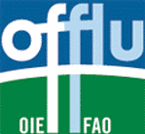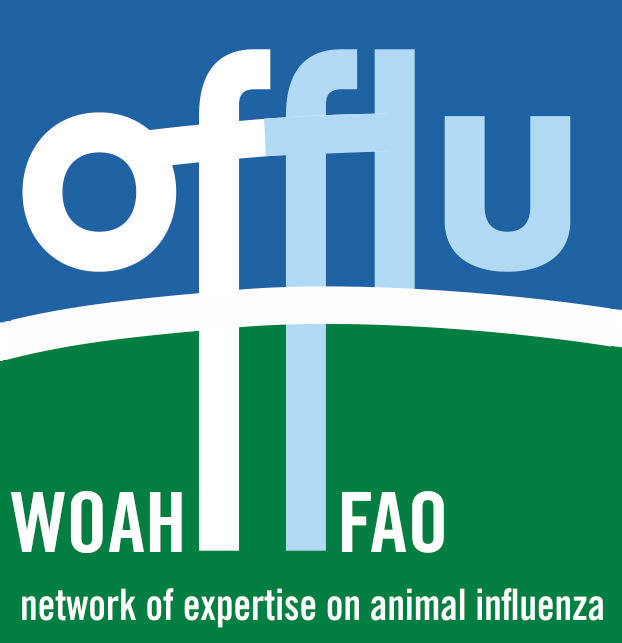
Meetings
OFFLU Committee Meetings
Technical Meetings
Review of AI Control Measures
OFFLU Review of Surveillance Projects
OFFLU Indonesia Project
OFFLU Egypt Project
FAO Projects
LAMP Project Final Report
DELTA FLU Project
Minutes of the OFFLU Steering Committee Meeting, 18th October 2007, at OIE, Paris
Chairman of the Steering Committee: Professor Steve Edwards Members of the Steering Committee: Juan Lubroth (FAO), Christianne Bruschke (OIE) Other attendees: Dr Vallat (Director General OIE), Alain Dehove (OIE), Gideon Brückner (OIE), Gwenaelle Dauphin (FAO), Keith Hamilton (OIE) Attending by telephone: Ilaria Capua (Secretary OFFLU and chairperson of the Scientific Committee) Apologies: Cristobal Zepeda (member of the Steering Committee)
SE opened the meeting.
The minutes from the previous Steering Committee meeting held in Verona 22 March, 2007 were agreed.
Review of OFFLU objectives
The 2nd objective should be amended to read ‘offer technical advice and veterinary expertise to Member Countries to assist in prevention, diagnosis, surveillance and control of avian influenza’. The 3rd objective should include ‘including early preparation of human vaccines’.
Action: KH to amend the OFFLU objectives and circulate for comment.
BV reminded the group of one of the raisons d’etre for OFFLU at its origin – ‘a network of collaborating veterinary laboratories to assist human laboratories with preparation of human pandemic vaccines by sharing material and data from avian influenza viruses circulating in birds’. It is important to improve the interface mechanism between OFFLU and the WHO influenza scientific network.
Proposed new structure of OFFLU
SE had proposed that the structure of OFFLU should be changed to improve its functionality. The Scientific Committee should be disbanded and an Executive Committee -chaired by IC, with KH and GD as members – supported by technical groups should be created. The Executive Committee would address operational issues and supervise the Secretariat; it would implement the decisions of the Steering Committee. The technical groups would focus on current relevant OFFLU related technical issues such as vaccines/vaccination or diagnosis. Technical groups will not be permanent but will be formed or dissolved by the Executive Committee in accordance with the scientific demands on OFFLU. Membership of OFFLU should be more inclusive. OFFLU should include other areas of expertise besides laboratory diagnostics such as epidemiology. The Executive Committee should put emphasis on inclusion of members from regions that are currently underrepresented like South America, Africa, Asia and Middle East. It was agreed that the restructuring of OFFLU should be adopted as soon as possible.
OIE and FAO are the only institutions to be members of the OFFLU network.
Action: IC (or KH on behalf of IC and GD) to draft a letter for SE to send to current and potential new members of the Scientific Committee and Scientific Collaborators informing them of the changes to the OFFLU structure and of the direction that OFFLU will be taking.
Action: IC to convene a meeting of the Executive Committee.
The OFFLU network should remain independent to ensure that it is never swayed by commercial interests. The technical groups should take responsibility for ensuring that their activities and conclusions are based on science and are impartial.
Action: IC/KH/GD the Executive Committee will draft its own terms of reference (ToR) and circulate to the Steering Committee for approval. This will also include provision of guidelines to prevent technical groups from being influenced by commercial interests.
Action: IC/KH/GD the Executive Committee will propose to the Steering Committee an initial list of suggested technical groups.
It had previously been agreed that there would be 2 laboratory-based technical OFFLU posts; 1 at Padova and 1 at VLA. The VLA OFFLU post is due to start on November 12th 2007. It was envisaged that the OFFLU Scientist would travel to laboratories and collect data. She would begin working on Indonesian isolates when she arrived at VLA in November.
There was discussion about an additional bioinformatician that FAO has proposed to fund and base at FAO, in Rome. SE emphasised that this scientist must work with OFFLU and in close cooperation with the laboratory in Padova as well as the OFFLU Scientist at VLA. The terms of reference of all three posts should be constructed in such a way that they complement each other. JL highlighted that the bioinformatician was part of a funded tripartite proposal circulated and agreed between FAO, OIE and WHO (funding from CIDA, Canada). IC mentioned that she does not have an urgent need for a bioinformatician at Padova. The Italian funds for this position have not been made available.
Action: KH and GD to work on ToR for the bioinformatician to ensure harmony.
BV expressed that he was not comfortable with the current framework of collaboration between FAO and OIE, VLA and Padova and that it was up to the Steering Committee to avoid any gaps and overlap. There needed to be more detailed discussion about the roles of the OFFLU post at VLA Weybridge GD and the bioinformatician based at FAO and KH of the OIE and additional guidelines and clarifications were needed.
KH suggested that the initiative to match vaccines (with current circulating field virus strains) in Indonesia was a good example of an OFFLU project; involving collaboration between several laboratories in the OFFLU network and the OIE funded OFFLU post at VLA Weybridge. It was acknowledged that GD had put a lot of hard work into this. JL stated that the Indonesia initiative represented significant and major involvement of FAO in the initiation of this project, including its funding, that it should be promoted as an FAO activity on behalf of OFFLU.
BV emphasised that OFFLU should be promoted wherever possible by all partners.
Budget
The Steering Committee were presented with an OFFLU global needs budget. Some – but not the majority of these activities -had been met by donor funds.
IC stated that IZSVe has not received funding for OFFLU related work between April and October 2007, and that the only funding received to date had been from FAO. GD explained that delays were in the approval process of a letter of agreement (LoA) between FAO and IZSVe which covered, amongst other things, funding of the OFFLU Secretariat, but these will likely be resolved within a few weeks. The previous LoA expired on 30th April. It was agreed that although IC needs funding to support the Secretariat and any ancillary expenses there does not appear to be a solution to filling the gap between April and December 2007, including the shipment of samples. JL reminded IC that FAO (EMPRES) funds international dispatch and will support shipping of samples to IZSVe or other reference laboratories.
It was announced that the costs of employing the OFFLU Scientist at Weybridge will be greater than those shown in the global budget needs.
Action: AD/KH to amend budget and for the first year remove the OFFLU post at Padova. This can be left in for the 2nd and 3rd years. Provide separate columns for funds already secured and for those funds that have not yet been secured.
The Steering Committee approved the revised budget needs statement for circulation to donors, excluding specific details about the VLA post.
On the human-animal interface it was noted that cooperation was important and that the specialisation of human and animal laboratories was essential. The human – animal interface should be constructed around the collaboration of the 2 networks. The animal and human networks should remain focussed on their respective specialisations.
JL reiterated that OFFLU was established to provide structure to the animal laboratory network to interface with the human laboratory network. The current Indonesia initiative will be a good endorsement of this.
A summary of GD’s presentation to the Steering Committee:
GD started with an explanation of the EMPRES-i database which provides information to GLEWS. The EMPRES-i database uses new software, will support epidemiology data and rumour tracking activities, and will incorporate diagnostic sample submissions and laboratory results. It has a GIS capability and could also import genetic data in order to combine temporal/spatial epidemiological and phylogenetic data.
GD pointed out that there was the opportunity for better sharing of laboratory results within OFFLU. FAO can try to activate their country offices. Some laboratories in developing countries find it difficult to visualise how they can become involved in OFFLU, there was a need to include them more by offering them membership of OFFLU.
GD suggested that results of field kit validation studies could be shared within the OFFLU network. SE responded by pointing out that validation is an ongoing process; this is included in work of OIE Reference Laboratories. There would be difficulty in addressing this complicated issue within OFFLU. GD underlined that FAO can facilitate collection of field data for the use of the main tests.
The presentation continued with an overview of the current and developing initiative in Indonesia, to investigate the antigenic compatibility of current circulating field strains and vaccines being used. GD is the technical lead on this USAID funded project. The OIE funded OFFLU Scientist will coordinate sequencing work in the UK. The next meeting for this project
– involvingall scientific collaborators -will take place at VLA Weybridge on 5th November.
It was agreed that similar initiatives were needed in other countries where vaccination was taking place, especially Egypt. IZSVe intend to perform similar work on African isolates.
Following a brief discussion it was felt that biosafety of laboratory workers was addressed in the OIE Diagnostic Manual, there was a need to highlight that this information was available. JL, however, emphasised that biosafety issues need to be practical for countries that are not currently capable of conducting diagnostic work under BSL3 conditions, but require national diagnostic services.
IC provided an update on GISAID, and asked members to support this initiative.
OFFLU Secretariat
SE suggested that it was more appropriate for the Secretariat to be housed outside a Reference Laboratory and favoured it being held by OIE or FAO.
The OFFLU Secretariat is due for renewal in April 2008.
Action: SE to draft a letter to this effect suggesting that if IC does not want to hold the secretariat for a further 3 years it should be housed at OIE or FAO. The changeover arrangements and date need to be finalised.
It was agreed that OIE and FAO could rotate this. OIE would take the first rotation.
Reference Laboratory collaboration
It was accepted that there was a need for greater collaboration between Reference laboratories and centres in the OFFLU network. It was proposed that a meeting of heads of OIE Reference Laboratories and FAO Reference Centres should be arranged by the OIE.



